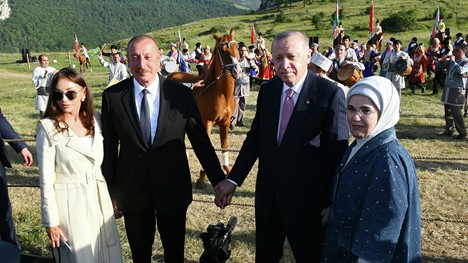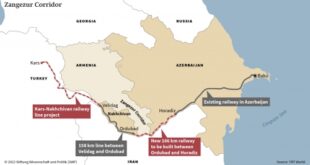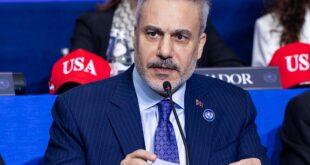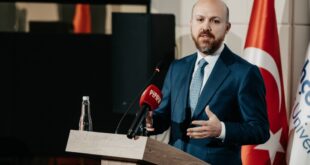Dmitry Plotnikov, an expert on “soft power” and the post-Soviet space authored an analysis titled “Turkey Is Building a New Ottoman Empire”, where he analyzed the growing ties between Ankara and Baku and concluded that Russia has lost its formerly dominant position in Azerbaijan. This is most evident in military relations where officers trained in Turkey are displacing the graduates of Russian military academies. Azerbaijan may serve as a springboard for further Turkish penetration of the Middle East.
All is not lost however. Russia can still use its soft power to partially recoup its positions. Azerbaijan may be an opportunistic recipient of Turkish aid but wants to maintain an independent posture, and Turkish assistance may paradoxically bolster this independence and thwart Turkey’s designs.
“Shusha Whispers
“The city of Shusha is the iconic symbol of Nagorno-Karabakh. The seizure of Shusha predetermined Azerbaijan’s victory in the conflict. So, it’s unsurprising that Azerbaijani President Ilham Aliyev along with his Turkish colleague Recep Tayyip Erdogan signed a bilateral declaration in precisely that city. The declaration, as the Azerbaijani leader put it, had “historical significance.”
“Aliyev stressed that relations between the two countries have always served as an example of ‘unique alliance and cooperation.’ However, the signing of the Shusha Declaration About Alliance [hereafter – Shusha Declaration] elevated them to a qualitatively new level. Of course, the Shusha Declaration is not a legally binding document and doesn’t provide for the creation of a full-fledged military-political bloc of the two states.
“‘[By signing of the Shusha Declaration], we want to demonstrate that in the future we will jointly safeguard each other’s security, as occurred previously, when Azerbaijan and Turkey stood together on all important issues,’ said Ilham Aliyev.
“The agreement assumes the two countries’ joint efforts in sustaining global and regional security, creation of mechanisms for the free movement of goods, and expanding cooperation in the defense industry sector. However the most important provision of the declaration states, that military action against one party automatically means a declaration of war against the other. After returning to Turkey, Erdogan announced plans to establish a Turkish military base in Azerbaijan.
“From June 28 to 30, the joint [military] exercises Mustafa Kemal Ataturk-2021 were conducted by the two countries. It was planned to stage these exercises even prior to the signing of the Shusha Declaration, but Erdogan’s visit to Azerbaijan preceded a high-level military meeting, dedicated to security cooperation. This is the 22nd joint exercise in the last three years. All these steps conform to the plan voiced by Aliyev to create “a smaller copy of the Turkish army” in Azerbaijan.
“The current agreements are a continuation of processes which have been systematically unfolding since 2017. Back then the two countries signed an agreement on cooperation in the defense industry, whose article 21 allowed Ankara to conduct training of the Azerbaijani officer corps at the training and educational facilities of the Turkish Armed Forces. This will make it possible to integrate the Azerbaijani army into Turkey’s military operations in the near future and replace the core Russian higher military educational institutions with Turkish ones. This will reduce informal contacts between the officer corps of the Russian and Azerbaijani Armed Forces to a minimum.
“Furthermore, the age group of Turkish military academy graduates are predominantly young officers, who distinguished themselves during the recent conflict. This fact allows them to gun for the jobs of the older generation of officers who received their education in Russian military academies. For instance, the dismissal of the Chief of General Staff of the Azerbaijani Armed Forces, Najmeddin Sadykov is connected to his orientation towards Russia and criticism of the increasing Turkish influence. And Ankara is always eager to provide assistance and protection to officers oriented towards it.
“Turkey is actively encouraging the modernization of the Azerbaijan Armed Forces. According to Turkish Minister of Defense Hulusi Akar, a corresponding road map has already been developed. On April 6, the two countries affirmed an agreement allowing Turkish military enterprises to become operational in Azerbaijan. Meanwhile, Turkish companies have been cooperating with the defense industry sector of Azerbaijan since at least 2018.
“However, the Turkish security policy in the region isn’t focused only on military cooperation. On October 27, 2020, the Turkish newspaper Turkiye published an article ‘The Decision on the Army of Turan’. The article’s authors urged the formation of a united pan-Turkic army comprised of Turkey, Azerbaijan, Kazakhstan, Uzbekistan, Turkmenistan and Kyrgyzstan. This clearly demonstrates that the development of military ties is on part of Turkey’s consistent strategy and that political factors are behind it.
“Two Nations, One Way
“’Some time ago we split up, now we are united, one nation, two states,’ reads the text of a song by the Azerbaijani singer, Talib Taley.
“This line perfectly reflects Azerbaijani society’s sentiments. According to sociological surveys, 91% of the population considers Turkey to be the country’s main ally. Undoubtedly, after Ankara’s support for Baku during the Nagorno-Karabakh conflict last year, this stance has only strengthened.
“For example, Azerbaijani billionaire Ilham Rakhimov, who has close ties with Aliyev, stated in an interview with the pro-government Yeni Musavat newspaper that it is high time for the two countries to move from the ‘one nation, two states’ model to the ‘one nation, one state’ one.
“There are adherents of the same opinion not only in pro-government circles, but also within the opposition. For instance, one of the leading members of the National Council of Democratic Forces, Gultekin Hacibeyli stated that, ‘the ideal of the Turkish Confederation is the most realistic model for emerging from the contemporary world’s conflicts and confrontations, especially in our geopolitical region where our country is not immune.’
“The ideal of Azerbaijani-Turkish unity has hovered over the country since the early 1990s. According to Sanubar Heydarova, a Ph.d in sociological sciences at Baku State University (BSU), the reason behind the Azerbaijanis’ mass enthusiasm for Turkish culture was the desire to return to their Turkic roots, to oust everything associated with Soviet times, including the Russian language.
“Back then, this trend was actively supported by the country’s authorities. The first president of Azerbaijan, Abulfaz Elchibey, proudly called himself a ‘soldier of Ataturk’ and defended the idea of an Azerbaijan-Turkey confederation. Suleyman Demirel, who served then as the Prime Minister of Turkey, stated that his country received the unique opportunity “to define the political future of the Muslim republics of the CIS [Commonwealth of Independent States].” In order to reach this goal, the Turkish Ministry of Foreign Affairs even created The Turkish Cooperation and Coordination Agency (TIKA), whose objective was developing relations with the Turkic-speaking countries of the former Soviet Union. “
“Abdulhaluk Cey, the former agency executive, claimed that modern Turkey, as the heir to the Ottoman Empire, should develop these relations even at the price of confrontation with Russia. Additionally, Turkey became the first country to recognize the independence of the post-Soviet Turkic-speaking republics. In those years, Turkish politicians eagerly discussed the possibilities for ‘restoration of Turkic unity.’ Back then new terms were used by the media: ‘Uzbek Turks,’ ‘Kyrgyz Turks,’ ‘Tatar Turks,’ and simply, ‘foreign Turks.’
“According to Azerbaijani historian Altay Geyushev, what makes Turkey particularly attractive to Azerbaijani youth is that in Turkey, secular values are actively promoted. Turkey is close to young people in spirit, but has more freedom than their homeland. Ankara energetically supports such sentiments through a network of Turkish lyceums and scholarship programs for Azerbaijani youth, that with each year facilitates strengthened relations between the two countries.
“Russian-Syrian journalist Abbas Juma believes that the concept of ‘one nation, two states,’ is a solid foundation for further integration, while Ankara’s participation in the last victorious Karabakh war strengthened and revived this concept even further. The expert believes that the Erdogan’s last visit to Shusha (which is called the “key to Karabakh”) is symbolic and iconic in its own right.”
“Bridge to Asia
“After the collapse of the USSR, new logistics chains connecting Asia and Europe emerged on the territory of its former republics. These changes were driven by the US, Great Britain and China, which were interested in expanding their trade volumes. Turkey also tried to horn into the new routes running through the Trans Caucasus.
“The commissioning of the Baku-Tbilisi-Ceyhan pipeline designed to supply oil from the Caspian region to Europe has become first of such projects. The presidents of Turkey, Azerbaijan, Georgia, Kazakhstan and Uzbekistan signed the agreement on its construction back in 1998 with the help of the US Department of Energy. However, after the pipeline was commissioned in 2005, British Petroleum (BP) became the pipeline’s operator and its largest shareholder.
“In 2013, Turkey became a participant in China’s One Belt, One Road initiative. A trans-Caspian international transport route, linking China to Europe via Kazakhstan, the Caspian Sea, Azerbaijan and Georgia, is planned. Along with Turkey, Turkmenistan, Kazakhstan, Azerbaijan, Ukraine, Poland and Romania have joined in the project. The commissioning of the Baku – Tbilisi – Kars railroad was within that framework.
“The outcome of the Karabakh war (in which Ankara played a role) laid the basis for the further development of the transport route from Azerbaijan to Turkey and on to Europe. For the first time in 30 years, thanks the agreements signed [as the result of the Karabakh war] made it possible to begin consultations on unblocking communication routes between Armenia and Azerbaijan.
“On April 19, the construction of a railroad from the Nakhchivan Autonomous Republic to Azerbaijan (which will be part of the route from Ankara to Baku and on to Iran and Pakistan) was announced. The decision on its construction was made in January, as a result of the negotiation between Aliyev and the Armenian Prime Minister Nikol Pashinyan in Moscow. As Lenta.ru previously reported, the annual volume of cargo transported through it will reach 10 million tons; and construction costs will be recouped within 12 years
“Routes through the Caspian Sea are also important to the Turkish government. A preferential trade agreement was signed amidst a fall in trade turnover with Azerbaijan from 3 billion USD in 2013 to 2.2 billion USD in February of 2020. The agreement took effect on March 1, 2021. The agreement nullified quotas and duties on exports and imports of products in 15 groups of goods. Additionally, Baku and Ankara are in negotiations to establish a free economic zone. Among the possible locations for the free economic zone are the Turkish province of Igdir and the Azerbaijani Nakhchivan Autonomous Republic. A railway running through these two regions will also connect Azerbaijan and Turkey.
“There are open discussions in Ankara on the benefits of this project. Turkish Presidential Spokesperson, Ibrahim Kalın said the commissioning of this railway is ‘at least as important as the liberation of Karabakh.’ The Speaker of Turkey’s Grand National Assembly, Mustafa Shentop called the project a ‘revival of the historic Silk Road.’ Azerbaijan may serve as a quasi-bridge to Central Asia for Turkey, at the same time providing Ankara with yet another pressure mechanism on Russia and with a resource base for further expansion in the Middle East.
“Status quo
However, despite the growing volume of cooperation between the two states, it should not be said that Azerbaijan now lies fully within the Turkish orbit of influence. According to a Valdai Discussion Club expert, political analyst, Farhad Ibrahimov, the actual international situation suits Baku perfectly: the country has close relations with Turkey, quite good and pragmatic relations with Russia, normal relations with Iran, Europe and other countries.”
“At the same time, the expert notes that Azerbaijan serves as a key element in Turkish plans to expand Ankara’s influence in the post-Soviet space, due to Azerbaijan’s role and geographic importance it has been cast in the role of a connecting link. However, the political analyst believes that today Turkey lacks the appropriate power and resources for such a project. Nevertheless, the country’s opportunities to enter the Central Asian markets are totally realistic. The region has a huge potential, especially resources-wise.
“The expert also noted that modern Azerbaijan doesn’t perceive itself as a part of the “Great Turan” concept (i.e. the popular idea among certain political circles of Turkic-speaking countries of uniting the Turkic nations: Kazakhs, Kyrgyz, Uzbeks, Turkmens, as well as many other Islamic nationalities of the post-Soviet space). Although there exist some opposition movements and intra-elite cliques in the country, who would desire that Azerbaijan become a part of this concept, it is insufficient for this idea to be decisive in the country’s political course.
“‘The “Great Turan” project per se is a rather vague concept that has no prospects, because it serves as a permanent element for Turkey’s growing influence,’ claimed Farhad Ibrahimov
Ibragimov believes that is now incumbent upon Russia to leverage all means of “soft power” in Central Asia and Transcaucasia, which would promote a positive image of the country among the population. “Our realization of major economic projects, investment [ventures] and other mechanisms will be able to safeguard our influence in the Transcaucasus for years to come,” stressed the political analyst.
“Azerbaijan’s relations with Turkey have certainly strengthened. Baku succeeded in creating a strong army due to Ankara’s assistance, and, undoubtedly, will have the opportunity to participate in infrastructure projects that will give a boost to the country’s economy. However, this process has a flib side. Baku strives to pursue an independent policy, and Turkish assistance makes such aspirations stronger. Thus, it is quite possible that Turkish support once provided, Azerbaijan will be able to withdraw from Ankara’s geopolitical projects in order to pursue its own policy.
“Russian-Syrian journalist Abbas Juma in an interview with Lenta.ru stressed that according to the Shusha Declaration, the sides will, among other things, coordinate the activities of diasporas, media outlets and diplomacy (as the key countries of the Turkic world should). This means that the Turkic world won’t be unequivocally unipolar and Ankara-oriented.”
 Eurasia Press & News
Eurasia Press & News




